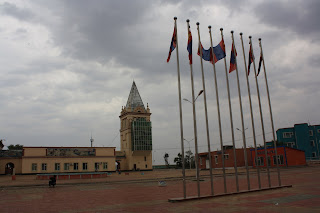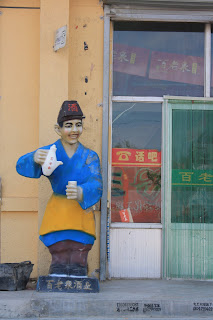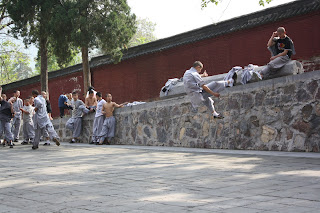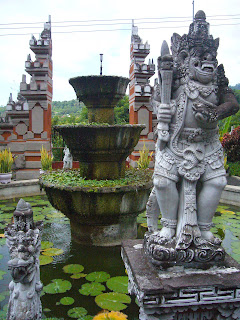As you probably know, Veronica successfully defended her thesis last week and has since returned home on her original ticket before returning to start work in January. A lot of our friends have left too, but a fair amount stayed too. One of them (HEY JEN!) teaches English, is arranging a literary festival (with no carbon footprint) and seems to do a whole bunch of other cool stuff. The other day, she asked if I was interested in playing Santa Claus for a bunch of Chinese children.
To be perfectly blunt, and slightly grinchy, my first question involved payment. After that was resolved my only other question was if I needed to gain any weight to become Santa! It was set - I was going to be Santa. And everyone knows, Santa doesn't speak Chinese.
China is not a very religious society, and is definitely not Christian. However, the "red and white" celebration of Christmas is VERY popular over here. Restaurants and stores have displays and schools and offices have parties. I'm pretty sure that no one knows who Jesus was, but they all know who Santa is - ME!
I took the subway to the first location in need of a Santa and was met by a library employee who took me to get changed and ushered me in to the restaurant hosting their Christmas party.
Now, for those of you who forgot (or don't know me), I'm Jewish. I haven't really done anything for Christmas since my family stopped celebrating it when I was four (or so) years old. I've been to a few friends' and extended family's Christmas parties, but I really don't know too much about the holiday. I sort of panicked when I realized that I probably couldn't sing most Christmas songs if I was put on the spot. Then I remembered...
Secular, English-Only Santa pretty much just says HO HO HO MERRY CHRISTMAS a whole bunch and gives out the gifts that the he's been told to give. Whew.

I had two engagements as Santa today. The first was for slightly older children (5-10) and the second was mainly children under 5 or 6. I was surprised, out of the entire 60 children I Santa'ed, there were about 4 children that seemed pretty fluent in English and a bunch more than knew more than just "Merry Christmas, Hello Thank You". I clearly couldn't speak Chinese as well as some of these kids. But I did try. When it was clear that the children didn't understand my English, I tried my Chinese. Sometimes it worked - often it didn't - all the time it was fun.

Unfortunately, the teachers didn't take as many fun pictures of me with the kids as I would have liked - but they did manage to take one of this creepy, two-headed clown that made balloon animals.






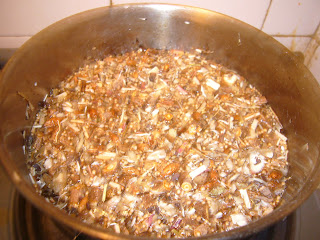









.JPG)





